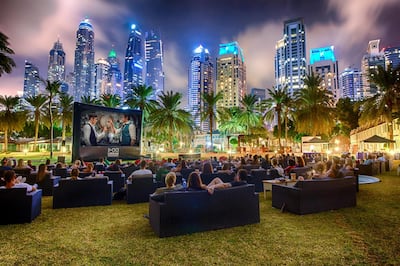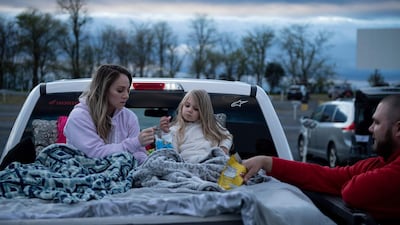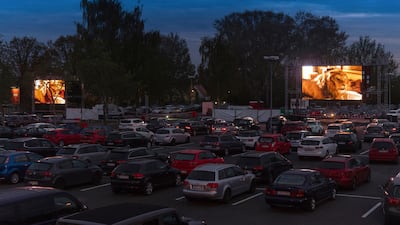They are straight out of an '80s Hollywood romcom, but could drive-in cinemas make a resurgence in a post-pandemic world – as a way to ensure social distancing?
Well, in some respects, they already have.
Evocative scenes have appeared across the globe, as families snuggle up under blankets from the beds of pick-up trucks or squeeze into the front seats of cars, snacks in hand, in front of a giant projector. The renaissance of the drive-in cinema has been noted in the US, Germany, South Korea and elsewhere.
And in the UAE, they could be about to make a comeback, too. At least in the cooler months.
As cinemas near two months of closure due to coronavirus regulations, movie releases have been delayed and Netflix subscriptions have soared, forcing cinema-owners to think seriously about how their operations might need to change, at least in the short to medium term.
Dubai, Sharjah and RAK could have drive-in cinemas
Urban Entertainment Dubai has been considering drive-in cinemas in the UAE for years, even before the pandemic. And now, the company believes they could become a new normal for crowd-wary cinemagoers.
"We are currently working on several projects across the UAE where we will be looking to implement drive-in cinemas," says Michael Hayes, the company's chief executive. He says the pandemic has made them a necessity.
Prior to the coronavirus outbreak, Hayes and his team were planning a 30-day minimum drive-in cinema project in Sharjah, and they are likely to reinstate this project once restrictions around outdoor events allow for it.

In Dubai, the company is planning to launch an extension of its own brand, called Urban Drive-in Cinema, with "a couple of locations we are really excited about", says Hayes. Urban Entertainment is also aiming to partner with other brands to offer separate types of drive-in cinemas in other Dubai locations.
It is also discussing a partnership with a client for drive-in events in Ras Al Khaimah.
Open-air cinemas and Rex drive-in: the UAE of yesteryear
Drive-in cinemas are not a new concept for the UAE. If anything, they are a nostalgic hark back to the '80s and '90s when open-air cinemas were a popular sight. In Dubai, drive-in movie theatre Rex Cinema was a local favourite.
Located on Al Khawaneej Road, near the Mirdif interchange, the cinema had air conditioning piped towards cars, which meant having to hang your head out of the window to stay cool. You could bring your own snacks, or buy refreshments from ushers. Indian movies were popular at Rex, while Hollywood releases were few and far between.

Rex was demolished, but the drive-in concept has reappeared sporadically. Last year, one was set up on Abu Dhabi's Al Hudayriat Island as part of the Abu Dhabi Moments cultural programme. In 2017, Lexus installed one as part of the Dubai International Motor Show.
In 2010, Fujairah announced a Dh35 million project that would be the home the UAE's first Arabian-style drive-in cinema. However, that has yet to come to fruition.
So, could the drive-in concept work in the UAE?
In pre-pandemic times and in the cooler weather, Urban Outdoor Cinema operated at the Habtoor Grand Resort in Dubai Marina, hosting two film screenings a week. Being able to plonk yourself down on a couch and catch A Star Is Born or The Shining under the jagged skyline of Dubai Marina, however, was not a possibility in the summer months, so the company's outdoor cinema was a seasonal project.

But when the weather is hot, drive-in cinemas will also be restricted by the rumbling of dozens of engines blasting air conditioning, which would drown out the impassioned speech by Julia Roberts in Notting Hill.
Nonetheless, Urban Entertainment has been running drive-in cinema events in Europe for more than 10 years, so Hayes believes they are especially well placed to implement them across the UAE and "not just to tide us over while social distancing is in place", but long term.
While he would not be drawn on revealing exactly when drive-in cinemas might become a reality, Hayes says "all will be revealed over the next few weeks".
"We feel now is the perfect time to launch this – especially as social distancing will still be important as restrictions on outdoor events start to relax," he says.
"People can sit in the comfort of their own cars, keeping social distancing in place, while enjoying a great movie on the big screen. This can be complemented by food, drinks and snacks delivered to your car."
Hayes believes the concept will be here to stay, even after social distancing rules are relaxed and Covid-19 is under control. It could be the "next big attraction" for the UAE, he says.
Cinema Akil's take on drive-ins: a good idea, but there is a catch ...
Butheina Kazim, founder of Cinema Akil in Alserkal Avenue, agrees with the concept only to an extent. Cinema Akil is currently shut because of coronavirus regulations.
Kazim believes drive-in cinemas could make a comeback in the UAE as a "novelty experience", as they have in other parts of the world – such as Lithuania and South Korea.
"With these difficult times, there is a hunger for a return to any form of public and communal experience," she says.
"Drive-in cinemas will never fully replace the joy of a shared space and film theatre, but until it is safe to do so, it is a great way to bring people together under the magic of cinema."
Kazim says that drive-in cinemas, such as Rex, were part of the UAE's "cinemagoing culture" and had been resurrected more recently as a "special nostalgic gimmick".
However, there are several hurdles to overcome in order to roll them out in a post-Covid-19 world – one of them being the aforementioned issue with the hot summer months.
"Unlike the countries where drive-ins are making a comeback, the UAE summer months are very hot and would require cars to remain running throughout the duration of a film – a notion that in the long run is environmentally hazardous and costly," Kazim says.
"The environmental impact is something cinema operators have to think long and hard about; if there is anything to learn from the experience of a pandemic, the impending threat of an ailing planet is a far more catastrophic consideration that humanity is still unprepared for."
Cinema Akil is also looking into "many ideas" in order to bring cinema back to audiences, both in the short term while its doors are shut, and in the long term, after restrictions are eased.









